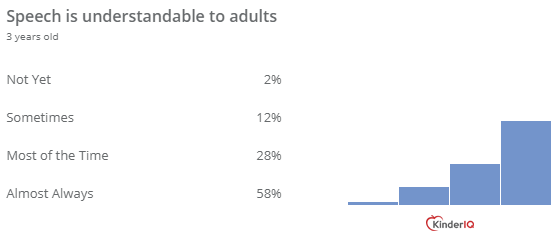When Is Speech Therapy Really Necessary?
tl;dr
- Compare your child's speech to their peers
- Try some simple letter-sound exercises at home
- Speak clearly at home (minimize "baby talk")
- Eliminate hearing as a problem with a quick test
- Get input from your pediatrician
- Consider a professional speech evaluation
Few things in parenting are more exciting than hearing your child begin to utter their first words. Every new consonant-vowel combination leads to greater joy and an increase in two-way communication between parents and child. But what if you are the only ones who can "decipher the code?" Having a special secret language with your spouse that no one else understands is cute. But with your child? A problem!
Most children begin to be understood by other adults around the age of 3 years old:

Over 80% of three-year-olds' parents report that their speech is understandable to adults.
What To Do If Your Child Struggles with Speech?
It is common for young children, especially toddlers, to struggle with specific sounds. If your child is sharing the same struggles with other children his or her age, there is probably nothing at all for you to be concerned about.
The concern arises when other children surpass your child, verbally. When this occurs and your child is struggling to string words together while other children are forming complete sentences, you may have cause for concern.
But what should you do to address this concern?
- Have a frank discussion with your child’s pediatrician about your concerns. The doctor may recommend trying some exercises at home to increase vocabulary, pronunciation, and comprehension for your child.
- Speak clearly when talking to your child at home. Don’t engage in “baby talk” with a child who is struggling to communicate. Children often learn by example. Set the example you want your child to emulate.
- Consider having your child’s hearing tested. It may not be a speech problem at all, but a hearing problem instead.
- Consider having a speech evaluation. This can be the first step in determining whether speech therapy is warranted. Your pediatrician can likely recommend a good speech therapist for the evaluation that has experience working with children of your child’s age.

It isn’t necessary to go with the first speech therapist you come across. In fact, you might want to see two or three and judge how they interact with your child, how your child responds to them, and how knowledgeable they appear to be about what is going on with your child and how to help. You also want to make sure you relate to the speech therapist. It’s harder to trust and follow the recommendations of someone you don’t trust.
When Should You Consider Speech Therapy for Your Young Child?
This is the real question for which you are seeking an answer. Unfortunately, it isn’t a one-size-fits-all children answer. Each child is different. While most parents agree they want to correct speech problems as quickly as possible – and especially before the child begins attending school where he or she may be exposed to teasing.
These are the stages and conditions in which you might consider reaching out to a speech therapist or your pediatrician at the very least about your concerns.
- 0-3 months. If your child doesn’t respond, at all, to the sound of your voice, it might be a good idea to ask questions.
- 4-7 months. If your child isn’t making typical baby noises (babbling, cooing, etc.) there is a possible cause for concern.
- 7-12 months. If your child makes less noise than other children in the same age group, it’s a good idea to ask questions.
- 12 – 24 months. This is where many things should occur verbally and communicatively. If your child says very few or no words, doesn’t appear to understand words you are speaking to your child or has difficulty with the B, H, M, P, and W sounds (at least by 24 months), you might want to consider reaching out to a speech therapist.
- 24-36 months. If your child isn’t forming sentences and has difficulties making D, F, G, K, N, and T, sounds or is difficult to understand in general by adults and other children, now is the time to consider speech therapy for your child.
- 36-48 months. At this stage, if your child is having trouble with certain words, making clear sentences, has a limited vocabulary, or doesn’t interact with other people or children very much, it could be a sign that speech therapy is required.
As a parent, you want what is best for your child. It may be difficult to always know what that is, but when it comes to speech therapy, there are signs to consider at different developmental stages that could indicate potential needs for a little help along the way. Speech therapy at appropriate points in speech development can help to prevent lifelong struggles with speech and communication for your child.